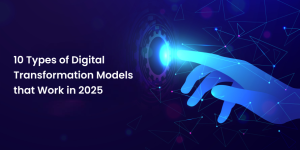How AI Agents are Redefining Digital Transformation

In the evolving world of technology, one aspect that is rapidly transforming is the way we interact with Artificial Intelligence, that is, AI agents. AI agents merge human creativity with computational power. From simplifying daily tasks to attracting customers through personalized recommendations, AI agents focused on optimizing efficiency and unlocking infinite possibilities.
So the question arises: Are AI agents redefining human connection and transforming the digital world? It is essential to understand the deep implications of AI agents and how they will redefine the business landscape.
In this blog, we will dive deep into understanding types of AI agents, how they work, their benefits and challenges, and how they impact different industries.
Understanding AI Agents
An AI agent is an autonomous system capable of performing specific tasks or making decisions based on its input and predefined goals. These agents show us the leap from traditional automation as now they are designed to follow a set of instructions but to think, adapt, and act independently.
AI agents can range from simple programs performing single tasks to complex systems managing complicated processes. These are utilized across various domains, such as robotics, gaming, virtual assistance, autonomous vehicles, and beyond. Some agents can be seen in the real world as robots, automated drones, or self-driving cars. Others are purely software-based, running inside computers to complete tasks.
Types of AI Agents
Each type of AI agent has unique functionalities and applications. So, let’s understand these variations to identify the right AI agent for your business-specific needs.
Virtual Assistants
AI virtual assistants perform tasks across devices and platforms and respond to queries in human-like languages in text or voice format. It uses natural language processing (NLP) to process, understand, and generate responses to the system users through voice-based interactions. Examples of AI virtual assistants like Amazon Alexa and Apple Siri, which allow users to access information quickly, control smart home appliances, and manage calendars.
AI Chatbots
AI chatbot is a computer program that communicates with users through text on websites, social media, and messaging apps. Modern chatbots increasingly use conversational AI techniques such as NLP to understand user input and provide automated responses to them.
Autonomous Systems
Autonomous AI is a branch of AI in which systems are advanced enough to act with limited human involvement. The actions autonomous AI systems perform are automating basic and repetitive tasks to analyze data sets. These algorithms are designed to learn, adapt, and execute tasks with minimal or no input from a human operator.
If you’re looking to explore more practical applications, check out some real-world AI agent examples that showcase how these intelligent systems function across various industries.
How AI Agents Work
AI agents work to simplify and automate complex tasks. So, let’s understand how these AI agents operate when performing tasks.
Set Defined Goals
The first step is to set clear goals for the AI agent. It could be like analyzing market trends or providing customer support. The agent uses its goal to plan tasks that make the final outcome relevant and useful to the user.
Based on the goal, AI agents break down the task into smaller actionable tasks that help the agent perform tasks on specific orders.
Gather Information
AI agents need information to act on tasks, so they gather relevant information. It could involve searching the internet, accessing databases, or interacting with other AI models for specialized tasks like image processing or geographical data analysis.
The agent’s human-like ability to use computers broadens its research capabilities. In a few applications, an intelligent agent can interact with other agents to access or exchange information.
Implement Tasks
Now, after having sufficient data, the AI agent strategically implements the task at hand. Once it carries out a task, the agent removes it from the list and proceeds to the next task. In between tasks, the AI agent evaluates if it has completed the designed goal by looking for external feedback and inspecting its own logs. During this process, the agent creates and acts on more tasks to reach the final outcome.
Moreover, until the goal is achieved, the AI agent will keep iterating, create more tasks, collect more information and feedback, and move forward without pause.
The Role of AI Agents in Digital Transformation
Digital transformation involves integrating different digital technologies to form an interconnected ecosystem that improves organizational efficiency, collaboration, and innovation. When AI is integrated into these digital solutions, strategies, and customer interactions, things get rolling into AI-driven digital transformation. Businesses often rely on different digital transformation models to structure this shift effectively, ensuring AI adoption aligns with their long-term goals and industry requirements.
Automates Business Process
It helps businesses utilize robotic process automation (RPA) solutions such as bots to automate rule-based, repetitive tasks, freeing human resources to focus on strategic initiatives. The use of these AI agents in business processes gives an additional hand to maximize their time through process automation.
Personalized Customer Experience & Data Analysis
AI agents continuously analyze data in real-time, provide suggestions, and even take actions based on previous guidelines to improve the user experience of your digital platforms. Also, with predictive analytics, you can analyze past data and spot patterns and trends to improve future results.
Excellent Customer Support
Customer support is crucial for building customer loyalty and satisfaction. So AI-powered chatbots equipped with NLP and machine learning capabilities allow businesses to provide seamless user experiences. Integrating AI-powered chatbots into your digital platforms allows you to smartly step up your digital transformation game.
Want to Accelerate Business Growth With AI Agents?
Consult us. Our AI developers specialize in integrating AI agents into your
business and drive you growth regardless of any industry.
How AI Agents Impact Industries
Due to the arrival of AI, many sectors of the economy are experiencing profound shifts. If it is completely trained, AI agents can perform a wide variety of activities. Employees get free from repetitive work and focus on their high-level technical difficulties or improve the quality of customer care. Some of the industries that are impacted by AI agents are:
Healthcare
AI agents in the healthcare sector analyze patient data, symptoms, and medical history to provide accurate diagnoses and recommend treatment plans. They can identify patterns that might be missed by human doctors, which leads to the early detection of diseases. Also, AI agents process genetic information and patient records to customize treatment plans for individual patients and optimize the effectiveness of therapies.
Finance
Artificial Intelligence agents monitor financial transactions in real time to detect and prevent fraudulent activities. They used machine learning algorithms to identify unusual patterns and flag suspicious activities. They execute trades on financial markets based on complex algorithms and process vast amounts of information quickly, which makes trading decisions more informed than those of human traders.
Manufacturing
With the help of AI agents, you can analyze data from sensors embedded in machinery to predict when maintenance is required. It helps in preventing equipment failures and reduces downtime. AI agents also ensure high-quality standards by inspecting products on production lines and identifying defects. They can work faster and more accurately than human inspectors.
Transportation
In the transportation sector, one of the examples we can see is self-driving cars that use AI agents to navigate, make decisions, and avoid obstacles. These agents process data from cameras, radar, and other sensors to provide safe transportation. It also has the ability to optimize traffic flow by analyzing data from various sources, such as traffic cameras and GPS devices. They can adjust traffic signals and provide real-time route suggestions to reduce congestion.
Benefits of Using AI Agents
AI agents have become a transformative force in the business market, offering multiple benefits that optimize operations and improve decision-making capabilities. So here’s an in-depth look at the benefits they bring to organizations.
Improved Decision-making
Advanced intelligent agents use ML to process and analyze vast amounts of data that inform and enrich decision-making processes. It utilizes predictive analytics to predict future trends, customer behaviors, and market dynamics, allowing businesses to make proactive decisions. For example, you can use AI agents to analyze product demands in different market segments when running an ad campaign.
Personalized Customer Experiences
Customers want engaging and personalized experiences when interacting with businesses. By understanding individual customer preferences and behaviors, AI agents deliver personalized recommendations, provide prompt responses, and maintain engagement outside regular business hours.
Increased Efficiency
AI agents excel in automating routine and repetitive tasks that allow businesses to execute these tasks with speed and accuracy. It not only boosts operational efficiency but also releases human staff to concentrate on complex productivity. Also, AI agents can operate continuously without breaks or downtime and ensure tasks are performed efficiently.
Cost-Effective Operations
Businesses can use intelligent agents to reduce unnecessary costs. By taking over high-volume, repetitive tasks, AI agents remove the necessity for extensive human intervention, allowing organizations to optimize their workforce and reduce operational costs. These agents minimize human errors, particularly in monotonous or data-intensive tasks, which reduce rework and associated cost savings.
Challenges and Considerations of AI Agents
AI agents need a huge amount of data to function effectively. This data must be both abundant and of high quality. Few of the challenges are:
Complexity of Integration
Integrating AI agents into existing systems shows significant challenges, mainly due to the complexity of AI technologies and the need for changes to current infrastructures. One of the major technical disturbances is the compatibility of AI systems with legacy systems.
Many organizations operate on outdated platforms that are not designed to support AI and require extensive modification. Beyond these technical aspects, there is a need for skilled workers who understand both technology and the business context in which it operates.
Ethical and Privacy Concerns
AI has filled its place in various sectors that transform how we interact with technology. However, this rapid integration raises significant ethical and privacy concerns that must be addressed to ensure these technologies are used responsibly. One of the primary concerns is the handling of personal data. It requires vast amounts of data to learn and make decisions.
The data often includes sensitive personal information, which can be susceptible to breaches and misuse. Since AI algorithms are trained on data generated by humans, any inherent biases in the data can lead to biased AI decisions. To address these concerns, there is a growing need for robust frameworks and ethical guidelines that respect user privacy and data protection laws.
Maintenance and Continuous Learning
AI systems, like any other technological systems require regular maintenance to ensure they function correctly and efficiently. This maintenance involves both hardware and software components of AI systems.
AI systems should continuously learn and adapt to new data, trends, behaviors, and regulatory requirements. This continuous learning presents several challenges that include the risk of “catastrophic forgetting,” where AI systems forgets previously learned information. Despite advances in AI, humans need to supervise AI systems to ensure they are making appropriate and ethical decisions.
However, the future of AI agents looks promising, it also presents challenges. The integration of AI agents is crucial for businesses looking to utilize advanced analytics and automation for improved decision-making.
Want to Streamline Workflows With Intelligent AI Agents?
Contact us and get our custom AI services that automate boring processes
and strengthen business intelligence.
Future Trends in AI Agents
The world of AI agents is rapidly developing, and new exciting opportunities are coming on the way. So here is the list of AI agents key trends that professionals believe will shape the future of this area.
Broader Capabilities of LLM
In the future, the capacity of large language models will see tangible growth that makes AI agents even more versatile and powerful tools for different tasks. They will adapt to new situations in real-time, have more real conversations with humans, and operate in complex conditions without any interference from humans.
Generative AI
Generative AI development is a new division of artificial intelligence that creates new realistic and creative materials that were previously not available. All industries have already known the benefits of generative AI and its boundless opportunity, this technology is still pickup the energy.
Integration With Different Technologies
When AI agents will be integrated with other advanced technologies such as AR/VR, robotics, cloud services and the Internet of Things (IoT), it will lead to new applications. Also it will create new possibilities for people to interact with machines and the world around them.
Ethical AI
As far as AI agents are becoming more powerful, it is crucial to ensure they are developed and used in agreement with ethical and security principles. Issues such as AI bias, algorithm transparency, privacy concerns, and the potential impact of AI on jobs will need to be addressed. This issue needs thorough AI consulting and a collaborative effort among researchers.
Multimodal AI Agents
The rise of multimodal AI agents shows a significant leap in AI capacities. These advanced agents can process and integrate multiple types of input data, including text, images, audio, and even video. This versatility brings a wide range of applications across different industries. For example, in the healthcare sector it can analyze medical data alongside patient records and symptoms, providing more accurate suggestions.
Why Choose Guru TechnoLabs for AI/Gen AI Development Services?
Guru TechnoLabs, a leading AI development company, allows businesses across various industries to utilize the potential of AI agents. These agents are not just technical advancements but reshaping the future of business. From virtual assistants and responsive chatbots to self-driving vehicles, AI agents are redefining the boundaries.
Our expertise in AI/ML solutions allows us to empower your business by integrating AI agents into your tech ecosystem. Our dedicated team of AI experts is committed to transforming your business digitally by delivering custom AI agents tailored to your unique business needs.
We focus on your business objectives and improve operational efficiency to reduce costs and drive innovation. Are you ready for the digital transformation of your business? Contact us.
Conclusion
The arrival of AI Agents signifies a crucial shift in artificial intelligence. It marks a new era where the interaction between humans and technology is redefined. So, we stand at the peak of a new era, where AI agents are tools but partners in strategic decision-making and customer engagement.
With Guru TechnoLabs, businesses can now include these intelligent agents. We have a team that can bring businesses to the forefront of innovation and customer satisfaction and navigate the future with confidence.
So, what to wait for? Contact us and schedule a free consultation as businesses are ready to explore the potential of AI agents and implement AI-driven strategies.
FAQs about AI Agents & AI Development Services
Traditional AI systems are often more rigid and focused on specific tasks, while AI agents are adaptable and capable of observing their environment and taking action to achieve specific goals.
AI agents initialize themselves and register to a service that acts as a search engine for agents. Then, when agents receive messages, they can respond.
No, chatGPT does not actively make decisions; it simply responds to the input given by the user. On the other hand, an AI agent is an autonomous entity that can observe its environment, process information, and take actions to achieve specific goals.
While AI agents automate certain tasks, they mainly improve human work rather than replace it entirely. They take over repetitive and boring tasks, which allows human employees to focus on more complex and creative aspects of their jobs.
AI agents can work simultaneously with your human agents and integrate seamlessly with their workflows. When AI agents handle complex questions autonomously, they give human agents time to build strong customer relationships. This shift dedicates more time to providing high-value activities rather than routine tasks. Choosing the right AI technology improves customer service and also significantly benefits your human agents.





















